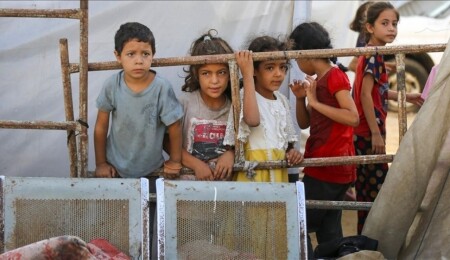Fragile Truce Offers Hope for Lasting Peace in Gaza

The long-awaited ceasefire and hostage agreement aimed at ending the 15-month war in Gaza has prompted celebrations on the streets of Palestinians and Israelis and hopes for a longer peace, with the Israeli cabinet meeting, which was crucial for finalizing the fragile deal, delayed due to a “last-minute crisis.”

The truce will take effect on Jan. 19 and involve the exchange of Israeli hostages for Palestinian prisoners, after which the terms of a broader peace deal will be finalised, the prime minister of mediator Qatar said late on Jan. 15.
Demonstrators in Tel Aviv calling for the release of the hostages rejoiced as news of the agreement spread, while thousands across Gaza celebrated the deal.
"I can't believe that this nightmare of more than a year is finally coming to an end. We have lost so many people, we've lost everything," said Randa Sameeh, a 45-year-old displaced from her home in Gaza City.
However, a "last minute crisis" with Hamas was holding up Israel’s cabinet’s scheduled approval of the deal, according to Israeli Prime Minister Benjamin Netanyahu.
Netanyahu's office said his cabinet won’t meet to approve the agreement until Hamas backs down, accusing it of reneging on parts of the agreement in an attempt to gain further concessions, without elaborating.
Izzat al-Rishq, a senior Hamas official, said the group “is committed to the ceasefire agreement, which was announced by the mediators.”
On the other handi, the territory's civil defence rescue agency said on Jan. 16 that Israel has pounded several areas of the Palestinian territory since the announcement of the ceasefire, killing at least 73 people, including 20 children.
"The bombardments are continuing,” said an official from the agency.
Israel's campaign has destroyed much of Gaza, killing more than 46,700 people.
The ceasefire agreement also triggered a political crisis within Israel, as two far-right ministers, Bezalel Smotrich and Itamar Ben-Gvir, threatened to withdraw from the coalition government if the ceasefire proceeds. Smotrich convened his party to decide whether to follow through on the withdrawal threat, intensifying tensions within the fragile coalition.
The first phase to start on Jan 19
The first phase includes a six-week halt to fighting and the opening of negotiations to end the war. Thirty-three of the nearly 100 hostages should be released over the period, although it’s not clear if all are alive. They include women, older adults and wounded people.
This first phase also includes a withdrawal of Israeli forces from densely populated areas of Gaza. That will allow many displaced Palestinians to return to their communities. Humanitarian assistance would surge, with hundreds of trucks entering Gaza each day. Final details still being worked out include the list of hundreds of Palestinian prisoners to be freed.
Phase two is harder as negotiations for this phase are to begin on Day 16 of the ceasefire. The phase will include the release of all remaining living hostages, including male soldiers. Israeli forces would withdraw from Gaza. But Israel has said it will not agree to a complete withdrawal until Hamas’ military and political capabilities are eliminated. And Hamas says it will not hand over the last hostages until Israel removes all troops.
Phase three calls for the return of the bodies of remaining hostages and the start of a major reconstruction of Gaza.
The ceasefire is meant to bring a surge in humanitarian aid to Gaza. According to U.N., at least 1.9 million people are displaced, while 92 percent of housing units are destroyed.
Some 68 percent of the road network is destroyed or damaged, and there are “zero” fuel reserves to operate generators at hospitals.
Nearly 88 percent of school buildings need rebuilding or major repairs. Food aid amounting to three months’ of rations for Gaza’s population is waiting to enter.
Source: HDN


Comments
Attention!
Sending all kinds of financial, legal, criminal, administrative responsibility content arising from illegal, threatening, disturbing, insulting and abusive, humiliating, humiliating, vulgar, obscene, immoral, damaging personal rights or similar content. It belongs to the Member / Members.